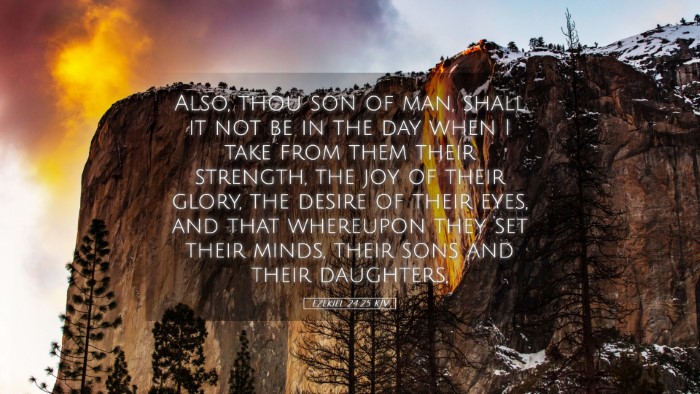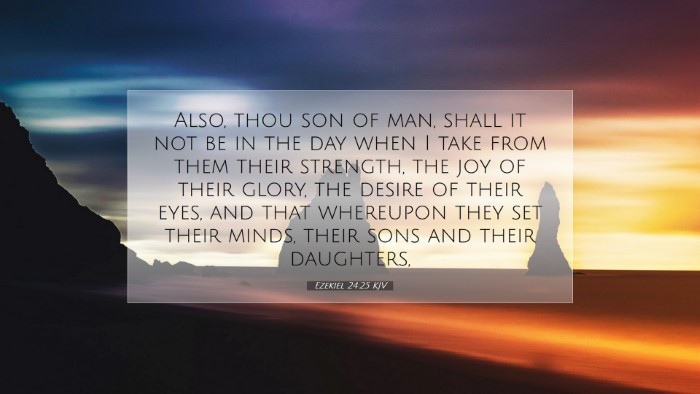Ezekiel 24:25 Commentary
The verse Ezekiel 24:25 states:
"Also, thou son of man, shall it not be in the day when I take from them their strength, the joy of their glory, the desire of their eyes, and that whereupon they set their minds, their sons and their daughters?"
Contextual Overview
Ezekiel 24 marks a significant turning point in the narrative of the prophet’s ministry, illustrating God's impending judgment on Jerusalem and the profound loss that would accompany this judgment. Ezekiel, as a watchman, was tasked with delivering God’s messages, warning the people of their imminent fate due to disobedience and idolatry.
Thematic Insights
- Divine Judgment: The verse signifies a moment of severe prophetic pronouncement, encapsulating the heart of God's sorrow over the impending destruction of Jerusalem.
- Loss and Mourning: The "joy of their glory" and "desire of their eyes" highlight the emotional and familial ties intrinsic to the community, underscoring the profound grief that will mark this calamity.
- Impending Mortality: The reference to "strength" and "sons and daughters" reflects the loss of life and vitality that comes with divine wrath, appealing to the human fear of mortality and loss.
Commentary from Public Domain Sources
Matthew Henry's Commentary
Matthew Henry observes that this verse emphasizes the heightened emotional stakes in God's judgment process. The taking away of strength and joy points to the reality of divine disfavor manifesting in tangible loss. He articulates that when God strips away what we hold dear, it serves as a wake-up call to repentance and awareness of our dependence on Him.
Albert Barnes' Notes
Albert Barnes provides insights that underscore the prophetic role of Ezekiel as a means of conveying the gravity of the situation facing Israel. He notes that this act of taking away signifies God's justice and the resultant feelings of emptiness and despair that will fill the hearts of the Israelites once their families are taken from them. He further stresses the importance of considering the spiritual implications of such losses, as they serve to draw attention to the need for spiritual restoration and reconciliation with God.
Adam Clarke's Commentary
Adam Clarke elaborates on the psychological and spiritual dimensions of this verse, suggesting that the loss of children and familial ties represents a deep spiritual void. Clarke emphasizes that these elements are not merely social constructs, but are integral to their identity as a covenant people. He highlights how this loss is also a manifestation of God's righteous judgment; it is a consequence of the people's persistent rebellion and unfaithfulness.
Theological Reflections
The implications of Ezekiel 24:25 for contemporary readers rest firmly on understanding God’s righteous anger against sin and the profound grief associated with divine judgment. This verse serves as a reminder to pastors and scholars alike that God desires not only obedience but a heart that longs for communion with Him. The loss described here invites reflection on our priorities and the depth of our devotion to God.
Applications for Modern Believers
- Recognizing God's Authority: Acknowledge the sovereign right of God to enact judgment and understand the reasons behind it.
- Reflecting on Loss: Consider what in our lives comprises our "joy of glory" and recognize how easily those can be taken away.
- Seeking Restoration: Use times of reflection on loss to deepen one's relationship with God, emphasizing a return to faithfulness.
Conclusion
Ezekiel 24:25 encapsulates profound themes of loss, judgment, and the longing for God’s favor that resonate throughout scripture. For theologians and students, this verse serves as a reminder of the personal and communal ramifications of disobedience, while also extending an invitation to reflect on the grace of reconciliation through repentance.


